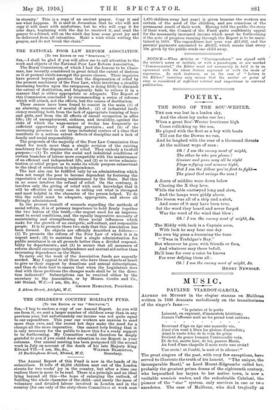THE NATIONAL POOR LAW REFORM ASSOCIATION.
[TO THIS EDITOR OP THE " SPECTATOR."]
Sra,—I shall be glad if you will allow me to call attention to the work and objects of the National Poor Law Reform Association.
The Royal Commission, of which I had the honour to be Chair- man, has recently considered in great detail the extent of distress as it at present exists amongst the poorer classes. Their inquiries have proved beyond question that the dispensation of relief by the present machinery of the Poor Law, while involving a steadily increasing burden upon the ratepayers, is doing little to diminish the extent of destitution, and frequently fails to relieve it in a manner that is either appropriate or adequate. The Report of this Commission concluded by recommending a series of reforms which will attack; not the effects, but the causes of destitution.
These causes have been found to consist in the main (1) of an alarming measure of mental defect ; (2) of industrial ineffi- ciency resulting both from the lack of appropriate training of boys and girls, and fromthe ill effects of casual occupation in after life ; (3) of unemployment, sickness, and invalidity, against the risks of which the wage-earner of to-day has frequently no sufficient opportunity of making provision ; and (4) of the increasing presence in our large industrial centres of a class that manifests to a serious extent defects of discipline and a lack of family and social responsibility.
The proposals of the majority of the Poor Law Commission thus stand for much more than a simple revision of the existing machinery for the dispensation of relief. They embody a twofold purpose:—(1) To render the social and industrial conditions of certain branches of labour more compatible with the maintenance of an efficient and independent life, and (2) so to revise adminis- tration or relief proper as to make its whole purpose subservient to the ideal of restoration to independence.
The last aim can be fulfilled only by an administration which does not tempt the poor to become dependent by fostering the expectation of an increasing maintenance by the State. But this in no sense involves the refusal of relief. On the contrary, it involves only the giving of relief with such knowledge that it will be effective in every case in calling out what is strongest and most helpful in the character of the person helped. To do this the relief must be adequate, appropriate, and above all fittingly administered.
In the present tumult of counsels regarding the methods of social reform, it is of primary importance to hold firmly together the two halves of this truth,—the urgent need for an improve- ment in social conditions, and the equally imperative necessity of maintaining and strengthening those social influences which make for the growth of an energetic, self-reliant, and responsible people. It is to promote these two ends that this Association has been formed. Its objects are officially described as follows :- (1) To promote the reform of the Poor Law of which it is in urgent need; (2) to maintain that a single administration for public assistance is on all grounds better than a divided responsi- bility by departments ; and (3) to secure that all measures of reform should encourage independence and mutual aid rather than increasing dependence on the State.
To carry out the work of the Association funds are urgently needed. May I appeal to all those who have these objects at heart to give us their support by donations and annual subscriptions, and thus do their best to ensure that when the Legislature does deal with these problems the changes made shall be in the direc- tion indicated ? Subscriptions can be received either by the secretary to the Association, or by Messrs. Coutts and Co., 440 Strand, W.C.—I am, Sir, &c.,
Adam Street, Adelphi, W.C.
GEORGE H&MILTON, President.














































 Previous page
Previous page